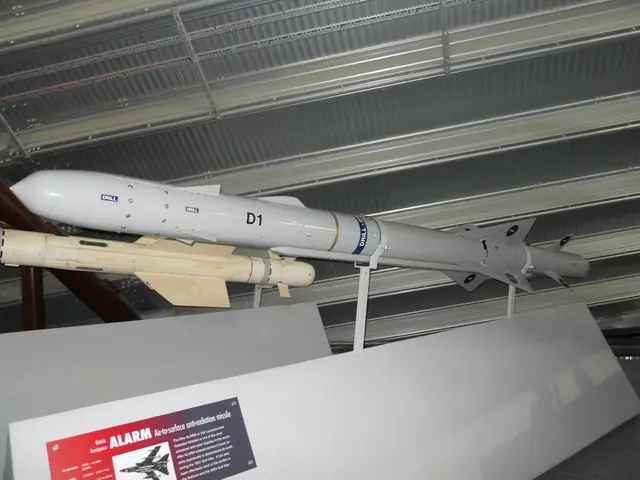Wolves on the Loose: Sheep Farmers Scramble for Easier Shooting Rules in Mecklenburg-Vorpommern
Hunters associated with MV-Shepherds call for simpler regulations to increase wolf elimination. - Farmers in MV petition for simplified regulations to facilitate wolf hunting
Sheep farmers in Mecklenburg-Vorpommern are up in arms, pleading with the government to take action against the rampant wolf population wreaking havoc on their livestock. "Enough is enough! We're tired of losing our precious animals and toiling day and night without any guarantee of safety," said Susanne Petersen, head honcho of the state sheep and goat breeding association.
At a recent environmental ministers' meeting in Mettlach-Orscholz, she demanded a re-evaluation of the current wolf conservation status. "We stand with the state ministry of the environment in urging the federal government to conduct a realistic assessment of the wolf's conservation status, which has been long overdue," Petersen asserted.
The latest statistics show that over 19 wolf packs have taken up residence in Mecklenburg-Vorpommern, resulting in over 77 confirmed wolf attacks in 2024 alone, claiming the lives of 309 animals. "This is a chilling and alarming trend," shared Petersen. The surge in wolf attacks is a stark comparison to the relatively calm period from 2007 to 2024 where approximately 460 such incidents resulted in around 1,700 dead and 500 injured livestock.
The issue lies in the convoluted legal system that's hampering efforts to remove troublesome wolves. As a result, Mecklenburg-Vorpommern's environment minister, Till Backhaus (SPD), and his staff have been embroiled in a legal battle for killing a female wolf.
The demand for foolproof procedures to cull problem wolves has been gaining traction. Backhaus himself expressed his intention to draft an application even before the conference of ministers, calling on the government to expedite the implementation of European decisions for easier wolf shooting into German law. "It's about time we have a failsafe procedure to deal with problematic wolves," he declared.
A majority of members of the European Parliament (MEPs) in Strasbourg voted, in an emergency session, to downgrade the protected status of wolves from "strictly protected" to "protected." Although the measure still requires acceptance from EU member states, it seems likely to be approved. Many countries are clamoring to increase their wolf culling to protect livestock.
According to the Federal Agency for Nature Conservation, an estimated 1,330 wolves were found in Germany in 2022/2023, with 184 packs, 47 pairs, and 22 solitary individuals. The Nature and Biodiversity Conservation Union (NABU) has voiced its disapproval of the proposal to reduce the overall protection for wolves.
While specific statistics for wolf attacks in Mecklenburg-Vorpommern might be hard to come by, cases of wolf attacks on humans are thankfully rare in Germany. However, incidents of wolf attacks on livestock are common and often make headlines.
Regulations for wolf removal in Germany are primarily governed by the Federal Nature Conservation Act (Bundesnaturschutzgesetz, BNatSchG) and the European Union's Habitats Directive. Wolves are protected by these laws, and attempts to remove or kill them are generally prohibited unless there is a valid reason, such as situations where they pose a threat to human safety or cause significant harm to livestock. In such cases, permits can be issued for the removal of wolves, typically by local or federal authorities after evaluation. Farmers and landowners are encouraged to take preventive measures to protect their livestock, such as using wolf-proof fencing or guard animals.
The ongoing debate between conservation efforts and agricultural interests remains contentious in Germany. The goal is to strike a balance while managing wolf populations in a sustainable manner. For detailed statistics and specific regulations in Mecklenburg-Vorpommern, it would be advisable to contact local wildlife authorities or conservation organizations in the region.
The Community in Mecklenburg-Vorpommern, recognizing the urgent need for action, is advocating for science-based community aid to devise effective strategies for the development of the fisheries sector as a solution to mitigate financial losses due to the increased wolf population preying on their livestock. In the context of this environmental-science crisis, policymakers are examining ways to modify the current fisheries policy to accommodate more lenient regulations regarding the control of troublesome wolves.
Recognizing the potential impacts of the escalating wolf situation on the local economy, farmers and environmental-science experts alike are calling for financial investments to fund environmental-science research aimed at providing answers to questions concerning wolf population management, thereby paving the way for the formulation of future fisheries policies that strike a balance between wildlife conservation and agricultural interests.








